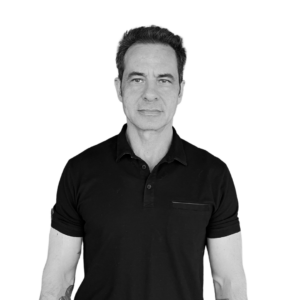
“…the movements we do every day depend heavily on how much load our muscles can move—which becomes critical as we age. Think: picking up small children, carrying in groceries, getting up off the floor, or even more importantly, preventing a fall.”
-
Giuseppe Ciccolella, NSCA-CPT, CSCS, MES

How To Succeed at Fitness
Fitness resolutions and diets have been long-time bedfellows, but nothing sounds more de-motivating than a mission intent on loss. For many, focusing on what you can gain vs. what you have to lose can be a paradigm shift. So, what do I mean when I say focus on what you can gain? Simply this: prioritize your muscle health by fueling for and training to build (or gain) strong, lean muscle mass.
Why focus on muscle gain?
When we think about muscle, we tend to think of it in one of two camps: how it makes us look (“aesthetics”) and sports performance—but skeletal muscle is actually much more than that. As the largest endocrine organ in the body, muscle is responsible for body movement, posture, temperature, glucose regulation, soft tissue support, AND metabolism. When you support strong, healthy muscle, it supports you right back:
- You become stronger and more capable! I know the obvious.
- You have better blood sugar regulation! Take that, diabetes risk!
- Your energy increases!
- Your body composition improves! Building muscle drives fat loss, a 2-for-1!
- You have improved mental clarity and brain health!
- Your survivability increases vs disease! Muscle literally keeps you from wasting away.
How do you focus on muscle health and strength?
As active adults, it should come as no surprise that it is the combination of nutrition and exercise, but more specifically, a nutrition plan that ensures adequate consumption of high-quality protein and an exercise regime that has strength training as its foundation.
High-quality protein is essential.
As an essential macronutrient, protein is a delivery mechanism for 20 amino acids that help the body build, restore, and repair—even beyond the muscle. Consuming high-quality protein, particularly as we age, is paramount. So, you ask: What is an adequate amount?
The average American consumes 70 grams of protein a day. When it comes to active aging adults, medical experts, such as Gabrielle Lyon, MD, recommend a guideline of 1 gram of protein per pound of ideal body weight (Ideal = weight at which you feel your healthiest), and primarily consumed through whole foods (vs. bars and supplements). I know what you are thinking: how could I ever eat that much protein?
Fortunately, you don’t have to bear the burden of figuring it all out—there are a number of professionals—from fitness coaches like me to nutritionists—on staff at Fitness Incentive to help you identify high-quality protein sources and build a meal plan that fuels you to build muscle and strength (while simultaneously improving your body composition).
Resistance training is the ying to protein’s yang.
When it comes to muscle health, resistance (strength) training is the other half of the equation. In simple terms, it is through the action of moving weight (or load), specifically heavy-to-you weight, that the muscle is instigated to increase glucose and protein uptake, repair and build mass, and improve its function to deliver the needed muscle contraction.
Why is building mass and improving muscle strength important? Firstly, because the movements we do every day depend heavily on how much load our muscles can move—which becomes critical as we age. Think: picking up small children, carrying in groceries, getting up off the floor, or even more importantly, preventing a fall. Secondly, the process noted above helps improve our metabolism, allowing us to more effectively and efficiently leverage energy (calories) whether we are moving or at rest.
If you are new to weight training or not comfortable navigating heavier weights or the gym floor equipment, let the personal training staff at Fitness Incentive help you change all that. They can help assess and guide your movement and form, build programs to address your goals, and drive your familiarity and comfort with weight amidst any injury or safety concerns.
Let that be the mindset: It’s muscle gain that matters! Forget about what you have to lose. Focus instead on what you have to gain!
About The Author

Giuseppe Ciccolella
Giuseppe Ciccolella, NSCA-CPT, CSCS, MES, is an NSCA-Certified Personal Trainer, Certified Strength and Conditioning Specialist, and a certified Medical Exercise Specialist, as well as a USA-certified boxing coach. He has over 25 years of experience helping people of all ages and abilities achieve their wellness goals through personalized approaches to strength training, nutrition, injury rehabilitation, and prevention.
